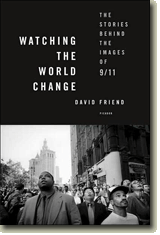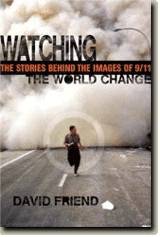« Previous · Home · Next »
March 24, 2007
SPRING OPENINGS
This weekend a compelling documentary premieres in select theaters across the country. The Prisoner: Or How I Planned to Kill Tony Blair examines the treatment of a single innocent detainee at the infamous Abu Ghraib prison. His story, intertwined with the tale of a compassionate American guard who befriended him, is a persuasive cinematic indictment of how the U.S. has conducted the war in Iraq.

The filmmaker, Michael Tucker, first e-mailed me after he finished his Iraq War documentary, Gunner Palace, in 2005. We kept in touch, and I was fortunate enough to be able to edit his account of the "back-story" of his new movie, which appears as a riveting and inspirational article on VanityFair.com, called "My Prisoner, My Brother." The film itself has generated wonderful notices, including Richard Schickel's sharp-eyed review on Time.com, which was posted yesterday. Schickel asks, in part:
"Can a film symbolically contain all the elements of a vast, complicated and enigmatic tragedy within the microcosmic story of a single individual accidentally caught up in the ghastly mess of — for convenient example — the Iraq war? Short answer: No, not normally. Longer answer: A modestly mounted, but curiously poignant little documentary called The Prisoner Or: How I Planned to Kill Tony Blair ...somehow — quietly, devastatingly — shows and tells you more than you may perhaps want to know about the dehumanization implicit in the mighty, blighted Iraqi adventure."
I'm eager to see three other new threads to the cultural conversation, all of which relate to themes raised in Watching the World Change:
1. The exhibition "The Event: Images as Actors in History" at the Jeu de Paume, in Paris (on view this spring), assesses the role of documentary and happenstance photographs in our understanding of pivotal events, including the attacks on New York and Washington on September 11, 2001. (CLICK HERE for a link to a slideshow of images from the exhibition.)
2. "My Trip to Al-Qaeda," by Lawrence Wright, is a well-received one-man show, now being performed in New York City, based on Wright's brilliantly reported book, The Looming Tower: Al-Qaeda and the Road to 9/11.
3. The new feature film, Reign Over Me, which opened yesterday, stars Adam Sandler as a widower who lost his wife on 9/11. I look forward to seeing it despite the cynicism in Caryn James's description in today's Times: "[Sandler's] character seems artifical from the start, a man who responds to the loss of his wife and three daughters in the terrorist attack by shutting out the world and zooming around New York on a small motorized scooter while playing '80s music on enormous headphones. There's not much any actor can do with that, or with the self-importance of a script that sees mourning and strained zaniness as a good match."

...Speaking of films, if you're interested in watching two short anti-war "public service spots," check out the links below. I made these faux commercials for VanityFair.com with my lifelong filmmaking partner, Marc Kravitz:
...And while you're in the clicking mode, pop over to the online magazine ALMANAC (March Issue), a crisp way of presenting photojournalism to an Internet audience.
...And for the serious student of photography I highly recommend Phaidon's inventive, invaluable primer, The Nature of Photographs., by Stephen Shore, a pioneer of color photography and the visual bard of Bard College. (In truth, Shore and Luc Sante are Bard's photographic tag-team. The current issue of Aperture runs a transcript of a lively conversation between the two, pegged to the release of the new book.)



